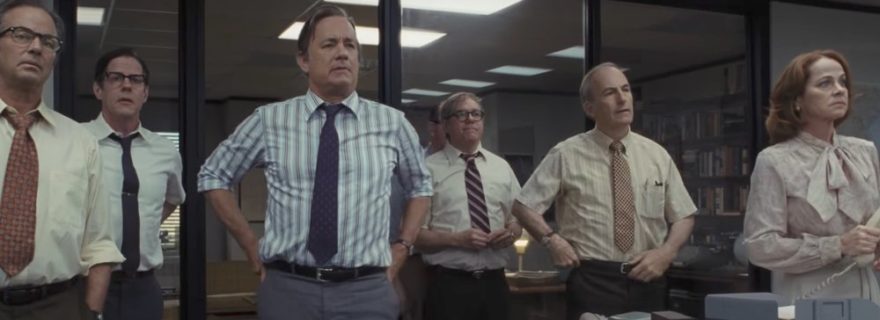'The Post'
Movie Rating:
3.5
Look out, here comes a Steven Spielberg movie starring Meryl Streep and Tom Hanks about the value of journalism challenging government and the struggle women face in a man’s world. It’s also a period piece and based on a true story. In other words, ‘The Post’ is so calculated for Oscar glory in 2017 that the nominations may as well have been handed out before the first day of shooting.
In some ways, ‘The Post’ is as blandly inspirational as the worst movies that clog up cinemas during awards season. Fortunately, it’s still a Steven Spielberg picture, which means that within the rigid confines of the feel-good assignment he was given, one of the most purely cinematic minds of the 20th Century still got to play with a Hollywood train set again. If ‘The Post’ proves nothing else, it’s that Spielberg can even make a movie about people standing in rooms arguing about journalistic ethics feel cinematic. In a weird way, that’s as much a testament to his considerable talents as his more iconic pictures.
As the great 1980s fantasist inches towards his own 80s, Spielberg’s interest has shifted out of spectacle and into his version of Frank Capra movies: tales of good people daring to be good in a world that (wait for it) isn’t particularly good. Middlebrow? Sure, but they still charm and come through the bearded one’s immaculate eyes. ‘The Post’ might not have the depth of his recent ‘Bridge of Spies’, but the mixture of period paranoia or cuddly morality once again proves to be a surprisingly satisfying night at the movies.
In this case, we’re shoved into Richard Nixon’s America, a time that was considered to be the peak of Presidential corruption until, you know, now. Meryl Streep stars as Kay Graham, who inherited The Washington Post from her late husband and struggles to get a foothold in boardrooms and editorial meetings with men who don’t take her seriously. Tom Hanks plays the editor of the paper, Ben Bradlee, determined to find a way to rise above the political puff and gossip pieces the organization specialized in before his tenure. Fortunately for both of them, they stumble into a gigantic story and an important moment in history after a massive leak of documents from the Pentagon reveals horrible secrets about the Vietnam War.
The New York Times publishes first, but in an unprecedented move is silenced by the White House. The staff of The Post soon find themselves holding the remaining papers thanks to some investigative work by an amusingly cast Bob Odenkirk as Ben Bagdikian. (His old ‘Mr. Show’ partner David Cross is also bumbling around the news room, which is damn delightful.) The bulk of the drama surrounds getting the Pentagon Papers and the perilous decision to publish them, which could sink the paper. It’s heady stuff, just not particularly suited to cinematic drama. That’s where Spielberg comes in, spinning his cameras around a series of people standing in rooms to create endless tension and a handful of beauty shots. It works. Somehow, Spielberg makes a stack of paper feel like a ticking time bomb and all of the discussions of journalistic ethics carry the weight of soldiers in a barracks tossing around a hand grenade.
Performances are obviously strong, given the names involved. Streep projects quiet dignity and subtle power in a role that carries a great deal of symbolic weight. (There’s a beautiful shot near the end where Spielberg silently shows what she meant to women that works far better than it should thanks to the talent on both sides of the camera.) She grounds the role and plays into the themes with a grace that only Streep can muster. Tom Hanks is more of a charming scoundrel type and Spielberg wisely uses his almost superhuman likability to round off any potential rough edges. Surrounding them are a murderer’s row of character actors like Odenkirk, Cross, Tracy Letts, Bradley Whitford, Bruce Greenwood, and Jesse Plemons to ensure none of the expositional dialogue feels unnatural. ‘The Post’ is as carefully crafted a machine as any Spielberg endeavor, despite the subject matter.
Unfortunately, while the movie showcases the legendary filmmaker at his best, it also boasts some of his most pandering qualities. (Gorgeously mounted inspirational fluff is still fluff after all.) The moral and ethical implications of the story have little gray area, everyone comes off as a wonderful person, and there are very few surprises. The way newspapers are lavishly shot by Spielberg is both an appropriately romantic ode to a dying form of media and baby-boomer pandering print porn. Also, no one seemed to be able to figure out how to end a story that ultimately was little more than prologue to the Watergate scandals. Amusingly, Spielberg opts for an odd cliffhanger leading to ‘All the President’s Men’. It could be a sly in-joke on the episodic comic book filmmaking that’s taken over Hollywood, or a lazy button haphazardly sewn onto the end of a story that runs out of steam.
Regardless, while ‘The Post’ might not be a perfect movie, it is a prescient, back-patting, and easy crowd pleaser for Liberals who could use a little moral, ethical, and political certainty to contrast against the current surreal shitshow in Washington.




Bob Allen
it’s sad to think that things like ethics (and particularly ethics in journalism), the Constitution, political corruption, freedom of the press.etc. are seen by you as “meh” topics. Maybe in the director’s cut, Spielberg can have Hanks don a mech suit and square off against an evil Nixon-bot or something. Would that make it “relevant” to you?
Seriously, some real life stories are pretty cut and dried. Did you often come out of WW2 movies saying “that was so pandering. They made the Nazi’s exterminating the Jews seem totally evil”? Did you similarly chastise Spotlight for being both about “just guys in newsrooms standing around talking” and because priests molesting kids had no “grey area”?
Josh Zyber
Don’t confuse the importance of the subject matter with the quality of its execution. Phil’s primary complaint here is about Spielberg’s pandering treatment of important material, which has absolutely been a big problem throughout his career.
Phil
Yeah, like Josh said (thank you sir) my problems were in execution, not content.
Ray
Yet you had no problems with the lazy execution–and content–of “The Last Jedi”???
Phil
Hahahaha! Good one.
Rayy
I’m not joking.
Bob Allen
Maybe try not to confuse (accidentally?) relevant with “pandering”. Or are you saying that it’s not allowed to have movies about freedom of the press, the first amendment, and political corruption when any of those things is happening in the real world (i.e. never)? If anything, I wonder if people who write blog posts are simply jealous of all the attention that real journalists get (particularly now)? That’s the only explanation I can see for the inherently boneheaded assertion that a particular topic is too boring for a movie. They made a compelling about the Helvetica font for chrissakes! Any topic can be made into a compelling story if it is told correctly. The “can even make a movie about people standing in rooms arguing about journalistic ethics feel cinematic” is something you simply don’t expect to see from a “professional” movie reviewer.
Josh Zyber
Bob, have you even watched the movie, or are you just defending it on principle?
Phil
Wow Bob…wow. I feel like you didn’t actually pay attention to what I was saying…
EM
Freedom of speech and the press, alas, does not come with a right to be understood.
Judas Cradle
I do miss the days when the print media was not a mouthpiece for the Democratic party, and just told the truth.
Sean Hannity
So just turn on Fox News and enjoy your non-fake news!
Ray
Fox News IS fake news.
Sergio Perez
Amen to that!!!!!!
Clark
Finally saw it and came here to read the review. You described my view perfectly: “That’s where Spielberg comes in, spinning his cameras around a series of people standing in rooms to create endless tension and a handful of beauty shots. It works.”
And may I add: it works VERY WELL. Much, much better than the overestimated Spotlight!